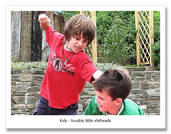 You are in the kitchen preparing supper when you hear a crash from the playroom. You gasp and then think, “uh oh, what now?” as you wipe your hands on your apron and rush out of the kitchen. You find your 9-year-old son, Caleb, covered in finger paint, with his painting upside down on the floor in front of him. He looks at you sheepishly and adds, “Uh…hi, mom.” You follow with an exchange about the events that led up to this disaster. Caleb tears up as he concludes, “I didn’t mean to. It just happened.” The two of you clean up his mess as best you can. You sigh, thinking about how much it will cost to clean and/or replace the carpet. After the playroom is back in order, you send Caleb to his room. Has something like this happened in your home? It’s an all-too-familiar scenario. What gets into kids that they so go off the rails? I have answers to this question, from the obvious to more severe. Little Caleb is by himself, bored, and not careful about his activity. Most acting out behavior is solo. Kids are just finding trouble. They may not be old enough or mature enough to take in the likely consequences of their actions. When they play with one another, someone is more likely to ask, “Are you sure that’s what you want to do?” While it’s not all of our job to entertain and be with our kids all the time, during their time-out we can question their understanding of the consequences of their actions and hold them accountable. Natural consequences are much preferred outcomes, rather than mere punishment. Natural consequences yield learning the impact of their actions, while punishment, both corporal and loss of privilege, yield bitterness and resentment. More troubling is that kids act out when they are fearful and/or anxious. Their behavior becomes code because they don’t know the words, or feel they have the right, to express their feelings. This type of acting out test the boundaries of their actions. Hyper kids continually test the boundaries. Their impulse control is neurochemically limited, so they test the boundaries to be sure that they are there. Here, repeatedly clarify the boundaries you are setting with your child, and then have him repeat your words after you. Make sure he understands the limits you have placed on his behavior. For example, oftentimes with pre-schoolers parents tell their child that they can’t have a fresh-baked cookie “because they are for dessert after dinner. The child will sidle up to the cookie sheet, where the cookies are cooling, constantly looking back at her mother. She’s checking the limits her mom has put on her to see if mom really means it. When mom reinforces her limits with a firm “I said no!”, the child reluctantly conforms. Setting and repeatedly confirming boundaries goes a long way toward reining in a child’s hyperactive, impulsive behavior. Finally, the more extreme rationale for a child acting out involves doing something to draw extreme attention to himself. This seems counter-intuitive. It’s typically a sub-conscious process, borne out of the child’s worry that something bad is about to happen in his world. For example, 12-year-old Alex is studying in his room, but hears his folks using loud words in the kitchen. He remembers the time that his dad stormed out of the house and didn’t come home for days. He slams his book shut and lets out a curdling scream. Both mom and dad come running to see if he is okay. Our kids 24/7/365 are measuring what’s happening in their world. If something seems off kilter, they worry. If they don’t understand the dynamics, they act out. Parents can circumvent this outcome by bringing their kids into a conversation about what’s happening in their lives. Address the worry directly, get an understanding, and they will be less likely to act out. Unconsciously they are concluding, “Mom and dad have got this. I don’t need to make a fuss to draw attention away from their upset.” When I was 12 years old, my then 17-year-old brother had a gymnastics accident. He fell on his head and broke his neck. He lived his life thereafter in a wheelchair as a quadriplegic. At my very formative age, I could have gone off the rails. My brother needed and got 90% of the attention from my folks. I could have been very jealous and acted out to get my folks attention. I didn’t do that, in part, because they sat me down very early and laid it all out for me. They heard my feelings and we talked about how I could be helpful. My fears and worries subsided and I felt a part of the process. That early experience probably contributed to my decision to eventually become a clinical psychologist. Why does your kid act out? Because he can, because he’s testing the limits, because he’s got issues that he can’t find the words to get out. Be there for him. Be clear about your expectations. Hold them accountable in ways that can be a teachable moment for them.
0 Comments
Leave a Reply. |
Archives
January 2024
Categories
All
|

 RSS Feed
RSS Feed
